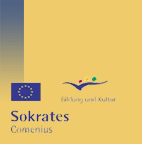|
Preparation:
Material:
Cassette-recorder with a
microphone, connection cable, cassettes recorded at home, microphone, strong magnets,
iron filings, Orff instruments or other materials that children can use to
make music
|
Steps:
The children put in the cassette
and press the cassette-recorders different buttons; they get acquainted with
the device.
Experiment 1: The children record something, for example a
song that they sing together. They listen to the recording and also try to
delete it.
Experiment 2: The children examine the tape; they pull out
the tape, feel it and turn it back in by using a pen.
Experiment 3: The children experiment with the magnet, the
tape and the iron filings: They record something, rub the magnet over the
tape, listen to the cassette again and realize that the recording is blurred
or has been deleted. With the magnet they put the iron filings "in
order".
The children record different
noises in kindergarten and let other children listen to them. The listeners
guess what the sounds are.
|
|
Technical Explanation:
Parts of the cassette-recorder:
Loudspeaker, microphone, cable, compartment for the
cassette.
Buttons:
forward, rewind, record, delete (press record and play at the some time),
pause, play
The tape of a C-90 cassette is 135 metres long. It
is a thin plastic layer to which tiny particles of ferric oxide adhere. These
are magnetised by the recording head.
Todays cassette-recorders have at least two heads,
the actual sound head which arranges the ferric particles on the tape so that
you hear the song that has been recorded when you press play, and the
so-called recording head which completely clears the tape before a recording
so that no remains of an old recording can be heard in a new one.
|











